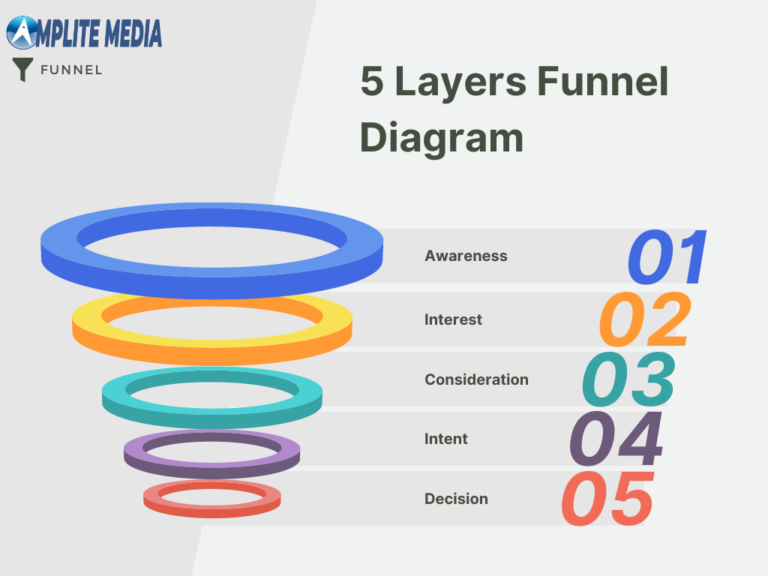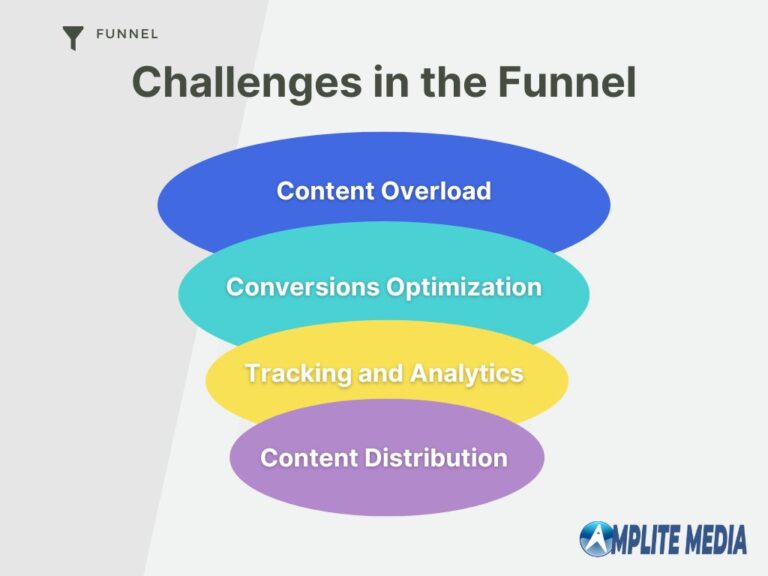Get a head start in content marketing – visit our glossary of terms
Content marketing has become a powerful strategy for businesses to attract, engage, and convert potential customers. The content marketing funnel is a crucial concept that outlines a prospect’s journey from initial contact with a brand into a customer. This article will comprehensively analyze the key factors influencing the content marketing funnel, encompassing marketing, content, and funnel dynamics. We will delve into the tradeoffs involved in balancing these factors, explore the challenges associated with different approaches, and highlight the significance of considering the impact when making content marketing strategy decisions.

Understanding the Content Marketing Funnel
Awareness: At the top of the funnel, prospects become aware of a brand’s existence through various channels like social media, search engines, or referrals.
Interest: Prospects are interested in the brand by consuming relevant content, such as blog posts, videos, or infographics.
Consideration: Prospects evaluate and compare the brand’s offerings with competitors.
Intent: Prospects indicate their intention to purchase, signified by actions like adding items to a cart or subscribing to newsletters
Decision: The final stage is where prospects become customers and make a purchase.
Marketing Channels and Tactics
One of the critical aspects of a successful content marketing funnel is choosing the proper marketing channels and tactics. Each channel, social media, email marketing, or paid advertising has strengths and weaknesses.
Social Media Marketing: Social media is the best way to create brand awareness and engage with a broad audience. However, converting social media users into customers can be challenging due to the casual nature of these platforms.
Email Marketing: Email campaigns allow businesses to nurture leads and deliver personalized content. While effective for retaining existing customers, it may be less effective for generating new leads.
Paid Advertising: Pay-per-click (PPC) and display ads can quickly drive traffic to the website, but they can be costly and may yield a different level of engagement than organic content.
SEO and Content Optimization: Investing in search engine optimization (SEO) and optimizing content for relevant keywords can boost organic traffic and attract highly targeted prospects. SEO is a long term strategy that may not result to immediate traffic.
Balancing Marketing Channels
Finding the right balance between marketing channels is crucial for maximizing the content marketing funnel’s effectiveness. Depending solely on one channel can lead to missed opportunities or over-reliance on platforms that may change their algorithms or policies, impacting a brand’s reach.
A diversified approach, combining multiple channels, can mitigate risks and reach a broader audience. However, it requires careful tracking and analysis to identify which channels perform best at each funnel stage. Businesses must continuously adapt their strategies based on data-driven insights.
The Role of Content in the Marketing Funnel
The content itself is the backbone of a successful content marketing funnel. The relevance and quality of the content play a pivotal role in attracting and retaining prospects.
Relevance: Creating content that addresses the target audience’s needs, pain points, and interests is essential. Understanding buyer personas and conducting thorough research enables businesses to tailor their content to resonate with potential customers.
Quality: High-quality content builds trust and credibility, positioning a brand as an authority in its industry. Engaging blog posts, informative videos, and visually appealing infographics are all key examples of content that can captivate the audience.
Balancing Content Types
Diversifying content types is vital to keep the audience engaged throughout the funnel. Using a mix of blog posts, videos, podcasts, webinars, and interactive content allows businesses to cater to different preferences and learning styles.
However, it is essential to strike a balance between variety and consistency. While variety keeps the content fresh and exciting, consistency in brand messaging and tone creates a sense of coherence and reliability.
Understanding the buyer’s journey is integral to crafting an effective content marketing funnel. Customer journey mapping involves analyzing how prospects interact with the brand at each stage and identifying pain points and opportunities for improvement.
Tailoring content to different stages of the buyer’s journey and segmenting the audience based on demographics, behavior, or preferences enhances the overall customer experience.

Challenges in the Funnel
The content marketing funnel has its challenges. Some common hurdles include:
- Content Overload: With abundant content available, standing out from the competition and capturing the audience’s attention is increasingly difficult.
- Conversion Optimization: Navigating prospects smoothly through the funnel and optimizing conversion rates requires continuous testing and refinement.
- Tracking and Analytics: Gathering and interpreting data from various marketing channels can be complex. Businesses need robust analytics to make informed decisions.
- Content Distribution: Ensuring content reaches the right audience at the right time can be challenging with evolving algorithms and limited organic reach.
The Impact of Decisions on the Content Marketing Funnel
Every decision made regarding marketing, content, and funnel dynamics profoundly impacts the content marketing funnel’s success. It is essential to consider the following:
Long-Term vs. Short-Term Goals: Balancing short-term gains with long-term brand building is crucial. Focusing solely on immediate conversions may sacrifice long-term customer loyalty.
Budget Allocation: Budget distribution across different marketing channels and content types requires strategic planning. Investing too heavily in one area may limit opportunities in others.
Data-Driven Decision Making: Relying on data-driven insights allows businesses to refine their strategies continually. Ignoring data and gut-driven decisions can lead to missed opportunities and inefficiencies.
Embrace the Power of the Content Marketing Funnel with Amplite Media
The Content Marketing Funnel is your roadmap to success in the digital landscape. By harnessing its potential, you can attract, engage, and convert prospects into loyal customers, driving your business to new heights.
Ready to take your content marketing to the next level? Let Amplite Media be your trusted partner in crafting a tailored Content Marketing Funnel that aligns with your unique goals and amplifies your brand’s impact. Unlock the full potential of your marketing efforts with data-driven insights, personalized content, and continuous optimization.
Take advantage of the incredible opportunities that await your business. Contact Amplite Media today and embark on a transformative journey toward content marketing success. Let’s build a thriving funnel that propels your brand forward. Together, we can achieve greatness!
Frequently Asked Questions
The Content Marketing Funnel is a strategic framework outlining the stages a prospect goes through, from initial contact to customer contact. It attracts, engages, and converts prospects through targeted content and marketing efforts.
The funnel comprises five stages: Awareness, Interest, Consideration, Intent, and Decision. At each stage, prospects are nurtured with relevant content tailored to their needs and interests, guiding them toward purchasing.
Several factors influence the effectiveness of a content marketing funnel, including the choice of marketing channels, the quality and relevance of content, and the optimization of the buyer’s journey.
Achieving a balance involves understanding your target audience, analyzing data, and refining your strategies based on performance insights. Diversifying marketing channels and content types and personalizing customer experiences can also contribute to striking the right balance.
Data-driven decision-making is critical for content marketing success. Analyzing metrics and tracking performance allows businesses to make informed choices, optimize campaigns, and improve overall funnel performance.
To stand out, create unique and valuable content that caters to your audience’s specific needs. Personalization, storytelling, and leveraging interactive formats can help cut through the noise and engage prospects effectively.
Conversion optimization involves testing elements such as CTAs, landing page design, and content offers. A/B testing and heat mapping tools can help identify areas for improvement and boost conversion rates.
Absolutely! Content marketing offers cost-effective ways for small businesses and startups. A well-executed content marketing funnel can level the playing field against larger competitors.
Mapping the customer journey is crucial as it helps identify pain points and opportunities at each funnel stage. By understanding how prospects interact with your brand, you can create content to their needs and expectations, enhancing the overall customer experience.
The timeline for results varies based on factors such as industry, target audience, and the effectiveness of your strategies. Content marketing strategies take time, and while some businesses may see early results, sustainable success often requires consistent effort and refinement over time.




